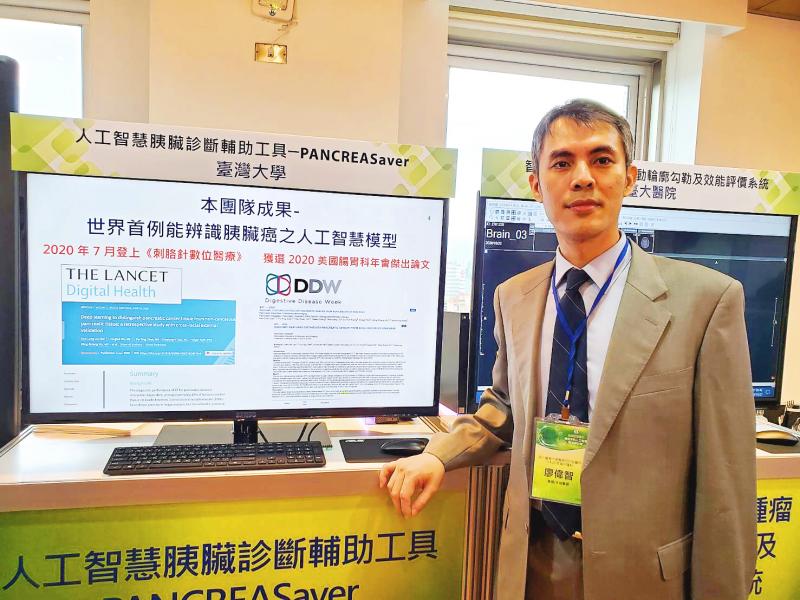National Taiwan University (NTU) Hospital has developed an artificial intelligence (AI) algorithm to improve radiologists’ ability to detect pancreatic cancer during computed tomography (CT) scans.
Pancreatic cancer killed 2,497 people in Taiwan last year and it is the seventh leading cause of death in the nation, Liao Wei-chih (廖偉智), an attending physician at the hospital’s Division of Gastroenterology, said on Tuesday last week at a conference held by the National Health Insurance Administration.
The conference discussed innovative medical applications of artificial intelligence using data provided by the agency, including more than 64.9 billion pieces of structured data on medical records of Taiwanese and 2.3 billion pieces of unstructured image data.

Photo: Lin Hui-chin, Taipei Times
While CT scans are the main tool used to detect pancreatic cancer, about 40 percent of tumors smaller than 2cm evade detection, Liao said.
During the early stage, pancreatic cancer shows almost no signs or symptoms, and the tumor often has indistinct borders, making it difficult to identify even by professional radiologists, he said.
Liao cited a case in which a CT scan showed no signs of pancreatic cancer, but an endoscopic ultrasonography identified a 1.5cm tumor in the patient.
Not every medical institution provides endoscopic ultrasonography services, so patients there could miss a timely diagnosis, he added.
The algorithm, trained by 3,000 pieces of image data, can yield a 98.3 percent sensitivity rate in distinguishing image patches of pancreatic cancer from non-cancerous ones, higher than the 92.9 percent of radiologists, he said.
It can detect cancerous tissue as small as 1cm, he added.
The five-year survival rate of pancreatic cancer patients is only 7.7 percent, because most of them have a late diagnosis, Liao said, adding that the rate could increase to 80 percent if tumors can be identified and removed before reaching 2cm, he said.
Although the algorithm does not to completely replace radiologists’ role in reading CT images, it can shorten their time of interpretation and reduce errors, he added.
Research results on the algorithm were published by the Lancet Digital Health in July.

The Grand Hotel Taipei on Saturday confirmed that its information system had been illegally accessed and expressed its deepest apologies for the concern it has caused its customers, adding that the issue is being investigated by the Ministry of Justice Investigation Bureau. The hotel said that on Tuesday last week, it had discovered an external illegal intrusion into its information system. An initial digital forensic investigation confirmed that parts of the system had been accessed, it said, adding that the possibility that some customer data were stolen and leaked could not be ruled out. The actual scope and content of the affected data

DO THEY BITE IT? Cats have better memories than people might think, but their motivation is based entirely around the chance of getting fed Cats can remember the identity of the people who fed them the day before, Taipei-based veterinarians said on Friday, debunking a popular myth that cats have a short memory. If a stray does not recognize the person who fed them the previous day, it is likely because they are not carrying food and the cat has no reason to recognize them, said Wu Chou Animal Hospital head Chen Chen-huan (陳震寰). “When cats come to a human bearing food, it is coming for the food, not the person,” he said. “The food is the key.” Since the cat’s attention is on the food, it

A New York-based NGO has launched a global initiative to rename the nation’s overseas missions, most of which operate under the name "Taipei," to "Taiwan Representative Office (TRO)," according to a news release. Ming Chiang (江明信), CEO of Hello Taiwan, announced the campaign at a news conference in Berlin on Monday, coinciding with the World Forum held from Monday through Wednesday, the institution stated in the release. Speaking at the event, Democratic Progressive Party Legislator Huang Jie (黃捷) said she believed this renaming campaign would enable the international community to see Taiwan

TOO DANGEROUS: The families agreed to suspend crewed recovery efforts that could put rescuers in danger from volcanic gases and unstable terrain The bodies of two Taiwanese tourists and a Japanese pilot have been located inside a volcanic crater, Japanese authorities said yesterday, nearly a month after a sightseeing helicopter crashed during a flight over southwestern Japan. Drone footage taken at the site showed three bodies near the wreckage of the aircraft inside a crater on Mount Aso in Kumamoto Prefecture, police and fire officials said. The helicopter went missing on Jan. 20 and was later found on a steep slope inside the Nakadake No. 1 Crater, about 50m below the rim. Authorities said that conditions at the site made survival highly unlikely, and ruled